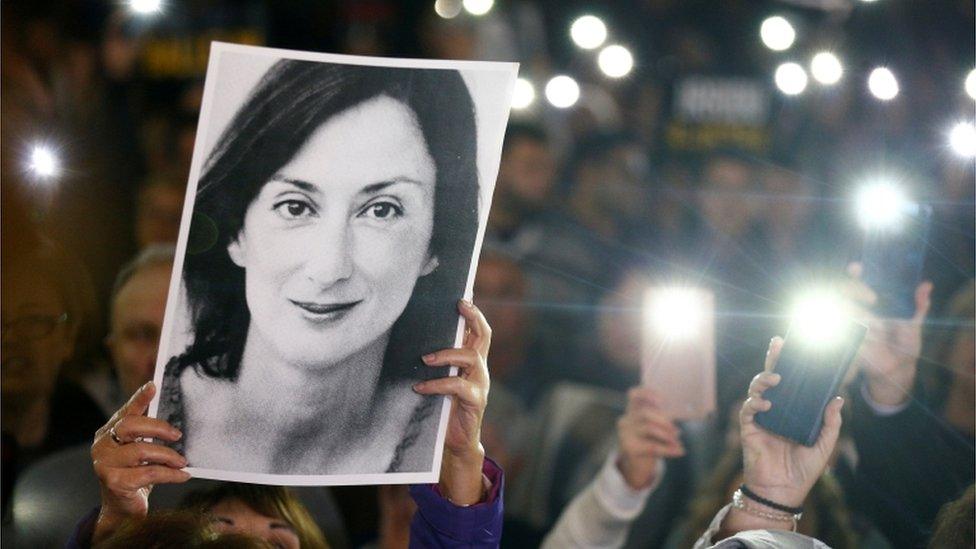Daphne Caruana Galizia: Malta suspect will not get immunity
- Published
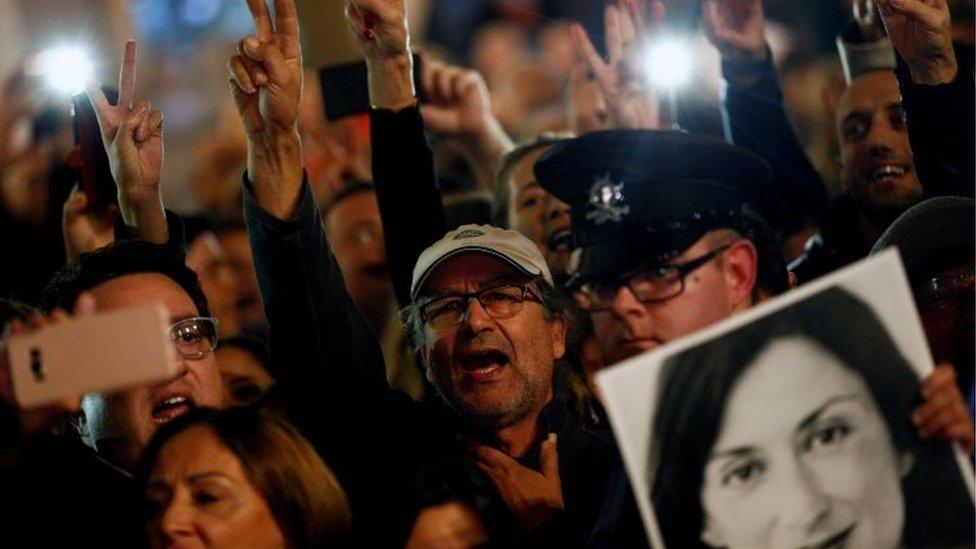
Prime Minister Muscat is facing calls to resign over the murder of Daphne Curuana Galizia
Malta's Prime Minister Joseph Muscat has said a suspect in the murder of journalist Daphne Caruana Galizia will not be granted immunity to reveal what he knows about the case.
Businessman Yorgen Fenech had requested a presidential pardon in exchange for information.
Caruana Galizia, an anti-corruption activist, was killed by a car bomb.
Mr Fenech appeared in court on Friday to argue the chief investigator of the case, Keith Arnaud, should be removed.
Mr Muscat is under increasing pressure to resign over the case, which started when Ms Galizia was killed in 2017.
Mr Fenech's lawyers argue that Mr Arnaud should be removed, due to alleged ties to Mr Muscat and Keith Schembri, the prime minister's former aide who is allegedly linked to the killing.
Mr Schembri resigned last week as chief of staff to the prime minister and was arrested on Tuesday.
Mr Fenech has filed a request for President George Vella, and not the cabinet, to consider his request for a pardon, alleging a conflict of interest.

View from the court
By Damian Grammaticas, BBC News, Europe Correspondent
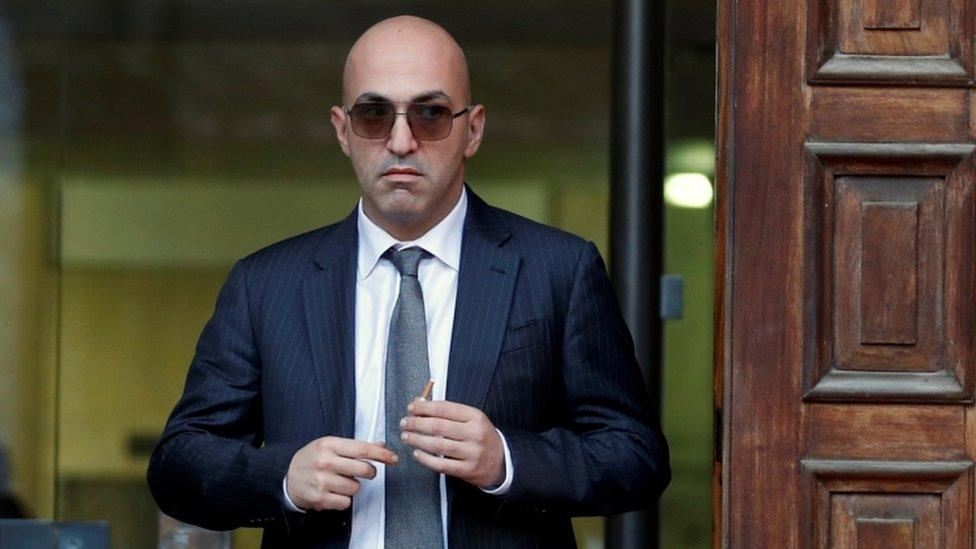
It was the most bizarre of sights. The man at the centre of the murder investigation that's rocking Malta strolled out of court, calmly lit a cigarette and walked down the street.
Shaven-headed, wearing sunglasses and an expensive suit, Yorgen Fenech was immediately surrounded by journalists. Mr Fenech is one of Malta's richest individuals.
I asked him if he was going to name people close to the prime minister who he suggests are implicated in events connected to the death of Daphne Caruana Galizia. He replied in the affirmative, adding he was "determined that the truth will come out". When I asked if he himself had ordered the journalist's assassination, he flashed back: "No I didn't say that. I'm confident the truth will come out."
Mr Fenech's lawyers say the chief police investigator is too close to those around Prime Minister Joseph Muscat, and they claimed in court that there was evidence his chief of staff was leaking secret details about the police investigation.
Claims and counter-claims of murky dealings: more reasons why many believe Daphne Caruana Galizia was right about the rotten nature of Malta's state.

The prime minister has previously said he will only step down when those who ordered the killing are identified.
However, the Times of Malta reported on Friday, external that Mr Muscat was preparing to announce his resignation "immediately" amid the worsening political crisis.
Mr Muscat's Labour Party has cancelled an event on Sunday at which the prime minister was due to speak.
In another development, Council of Europe special rapporteur Pieter Omtzigt, who was appointed in 2018 to monitor the inquiry, called on Mr Muscat to resign.
Allow X content?
This article contains content provided by X. We ask for your permission before anything is loaded, as they may be using cookies and other technologies. You may want to read X’s cookie policy, external and privacy policy, external before accepting. To view this content choose ‘accept and continue’.
"Only the three initial suspects have been charged and no-one has been convicted," he said in a statement, external.
"It is therefore absolutely essential that the next government is free of the suspicions of corruption and misconduct that surrounded the Muscat administration."
Last week Mr Fenech was arrested in a dramatic raid on his yacht. He received hospital treatment after his arrest and has been given police bail.
Mr Fenech was identified last year as being the owner of a mysterious Dubai-registered company, 17 Black, listed in the Panama Papers - a massive leak of documents from an offshore law firm in 2016.
Caruana Galizia wrote about 17 Black eight months before her death, alleging it had links to senior government figures.
What did the cabinet decide?
Mr Muscat called an emergency cabinet meeting on Thursday night to decide whether to grant Mr Fenech's request.
The prime minister said it was the most appropriate course as Mr Fenech had made allegations against the PM's former chief of staff, Keith Schembri - who resigned last week and was arrested on Tuesday.
"I left the final decision with my colleagues, who decided that it's not fitting to grant a pardon," Mr Muscat announced at a press conference, flanked by ministers.
He stressed that his cabinet had followed the advice of the chief of police and the attorney general.
Police confirmed on Thursday that Mr Schembri had been released and was no longer of interest to investigators.
Galizia's son, Paul, in 2018 called for a public inquiry over his mother's death
Angry protesters gathered outside the government palace in the early hours of Friday morning. One of Caruana Galizia's sons threw fruit at the car of a government minister and shouted insults, Reuters news agency reports.
Under Malta's constitution a pardon can be granted to "any person concerned in or convicted of any offence".
Why have events come to a head?
Investigations into Caruana Galizia's murder intensified when a suspected middleman was pardoned on Monday.
The prime minister told parliament the suspect, Melvin Theuma, was being given immunity in return for information about the killing. Maltese reports suggested he had audio recordings linked to the case.
On Tuesday, Tourism Minister Konrad Mizzi resigned and Economy Minister Chris Cardona took the decision to suspend himself after being questioned by police on Saturday. They deny involvement.
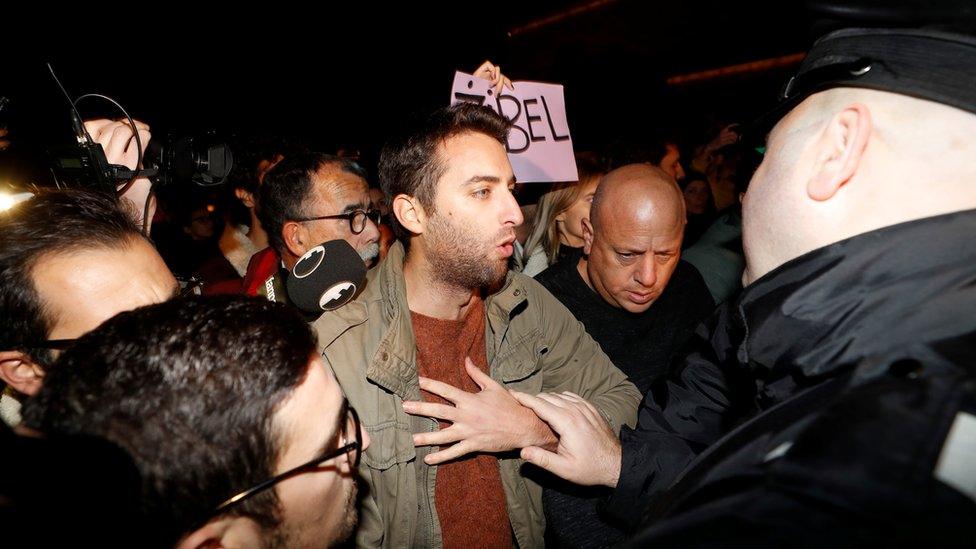
Protests outside government buildings have intensified
Mr Muscat's chief aide, Keith Schembri, who had previously been named in the Panama Papers, quit.
Caruana Galizia alleged that Mr Schembri and Mr Mizzi had benefited from secretive "shell companies". Both deny wrongdoing.
What do we know about the murder inquiry?
Three men - brothers Alfred and George Degiorgio and their friend Vincent Muscat, all in their 50s - have been charged with triggering the bomb which killed Caruana Galizia near her home in October 2017. They were arrested in December 2017 and pleaded not guilty in pre-trial proceedings.
Vincent Muscat later told police the bomb had been placed in Caruana Galizia's car while it was parked outside the walled compound where she lived. The killings earned the trio 150,000 euros (£132,000), Reuters news agency reports, external.
Police have continued to investigate in the hope of finding out who ordered the killing.
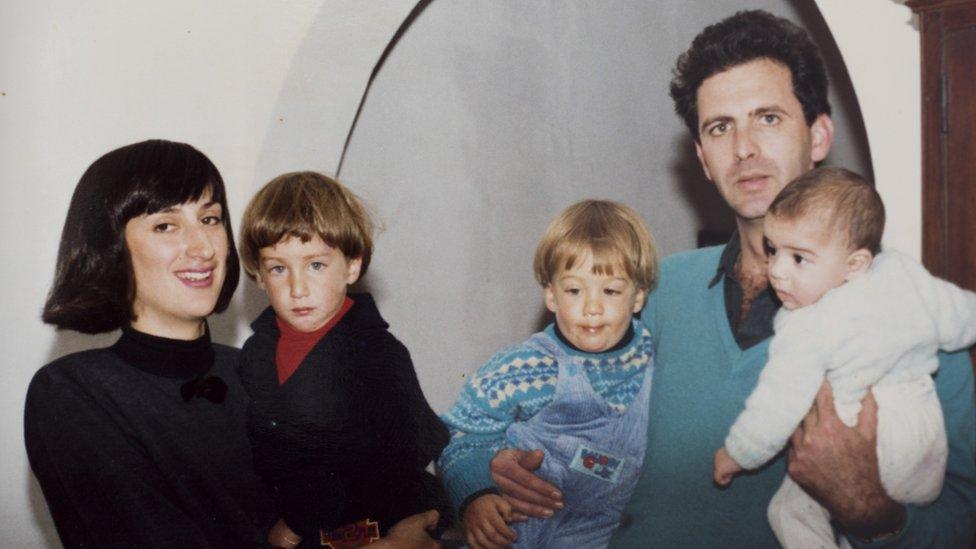
Caruana Galizia (pictured in 1989) was survived by her husband and children
The late journalist's sister, Corinne Vella, told the BBC it was time the truth came out.
"We're finally starting to see some progress in the investigation into Daphne's murder," she said.
"It's welcome, it's important, but it's very far long overdue. To us, Daphne's death has always been linked to her work, and we've maintained all along that justice for Daphne means justice for her murder, but also justice for all her stories, because to us they were connected."
- Published26 November 2019
